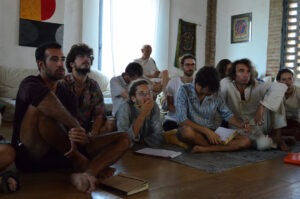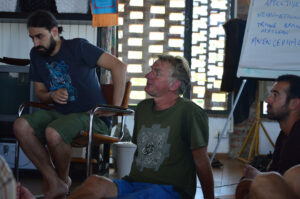
Neuroscience and Experience, as taught as an advanced seminar at Stanford;
Biosemiotics/Linguistics, as taught on the Symbolic systems program at Stanford;
Science and Society, as taught in the Molecular and Cell Biology program at UC Berkeley;
Irish Music and Culture, as taught for the Celtic Studies program at UC Berkeley.

As a result of this course, the graduate will have acquired the skills to be able to:
- Work as a language-engineer, in particular for the localization of software to other languages and cultures;
- Design a computer interface (CI) for specialized use, including for mentally and physically challenged individuals, as US law requires they have unrestricted access to information;
- Assist – and of course direct – R+D in the multitude of applications that will emerge over the next several generations of computing, including (but not restricted to) in particular speech processing and machine translation.
- Participate in an informed way on debate about how science impacts on society, particularly focusing on their own cutting-edge area.
- Work as an applications programmer in a range of commercial and industrial environments.
As in all these proposed courses, the student can take subjects from edX and/or Coursera*, and signatures of completion will be accepted as tentative proof that the student has mastered the material. However, in project assessments, those students that have no proof of mastery other than these signatures may be asked questions in oral examinations relating to the content they claim to have mastered. Alternatively, and particularly in the case of Coursera courses that do not give signatures of completion, the students may ask to be examined on the material , and an exam will be prepared for them.
 It is envisaged that 30 units will be taken in the two “years” which may of course reflect more or less chronological time The only assumption is that the student has an undergraduate degree involving a major in one human language other than the student’s native language. Obviously, the subjects below can be the core for a range of undergraduate degrees, and indeed may be taught in conjunction with a foreign language.A central focus is machine translation The challenges are these;
It is envisaged that 30 units will be taken in the two “years” which may of course reflect more or less chronological time The only assumption is that the student has an undergraduate degree involving a major in one human language other than the student’s native language. Obviously, the subjects below can be the core for a range of undergraduate degrees, and indeed may be taught in conjunction with a foreign language.A central focus is machine translation The challenges are these;
- To begin the process of mathematical formation, initially through relatively introductory courses in calculus and algebra
- Likewise, to familiarize the students with computers, beginning with introductory courses
- To continue the computational formation with algorithms and applications development courses
- To culminate with a set of subjects focused on Computational linguistics
- Finally, a set of projects and advanced seminars
Preparatory courses prior to year 1 for those unsure of their ability to cover the material;
Mathematics
A preparatory course is at
https://www.coursera.org/learn/pre-calculus
https://www.coursera.org/learn/trigonometry
Calculus may be handled by this or an equivalent:
https://www.coursera.org/course/calc1
Computer Science
There is good introductory material at
https://x.cs50.net/2013/syllabus
FIRST SEMESTER
Logic
This course will satisfy the requirements
https://class.coursera.org/intrologic/class/index
Linear algebra
This course will satisfy the requirements here
https://www.coursera.org/course/matrix
Algorithms 1
https://class.coursera.org/algo/class/index
is a very good start
compare https://www.coursera.org/course/algs4partI
which does not issue Certs
Applications development
SAAS gives a good intro
https://www.edx.org/courses/BerkeleyX/CS169.1x/2012_Fall/about
SECOND SEMESTER
algorithms 2
https://www.coursera.org/course/algs4partII
This will not involve a certificate
App Dev 2
SAAS2 https://www.edx.org/courses/BerkeleyX/CS169.2x/2012_Fall/about
NLP/Computational linguistics
either this
https://class.coursera.org/nlp/wiki/view?page=syllabus
or a computational linguistics module can be taken
HCI
https://class.coursera.org/hci/wiki/view?page=Syllabusandcalendar
An introduction to text linguistics, rounds out the year and we are preparing this
YEAR 2
Semester 1
AI
https://www.edx.org/courses/BerkeleyX/CS188.1x/2012_Fall/about
Stats in the age of Big data
Non-certificate courses include
Introduction
https://www.coursera.org/course/compdata
More advanced
https://www.coursera.org/course/dataanalysis
https://www.coursera.org/course/datasci
COMPILERS
https://www.coursera.org/course/compilers
Advanced seminars/projects will be the focus; the seminars will include topics from other areas such as tensor calculus, neuroscience and science and society as well as project presentations by the students with mandatory attendance. There will be a minor thesis, with subject proposed by either faculty or student (7 credits) and a major thesis to be entirely conceived by the student (10 credits)
Internship – 6 months, supervised at a participating company
*We do not claim to own content linked at Coursera and edX. We simply suggest courses you can take online that satisfy our requirements. There are zero fees for full-time students. Others who wish to take one our own modules, like consciousness studies, may pay a suggested donation. Nobody turned away for lack of funds!

As a result of this course, the graduate will have acquired the skills to be able to;
1. Design a computer game using specialized knowledge of how the brain processes the information presented on the screen;
2. Help to diagnose a patient based on a print out of the relevant genetic information, an interview, and overt behaviour analysis;
3. Design a computer interface (CI) for specialized use, including for mentally and physically challenged individuals, as US law requires they have unrestricted access to information;
4. Assist – and of course direct – R+D in the multitude of applications relating to cognition that will emerge over the next several generations, including (but not restricted to) intelligent search, machine translation, human CI in general (including neural implants), speech processing, bioinformatics approaches to brain, and so on
5. Participate in an informed way on debate about how science impacts on society, particularly focusing on their own cutting-edge area.
6. Work as an applications programmer in a range of commercial and industrial environments
 As in all these proposed courses, the student can take subjects from EDX and/or coursera, and signatures of completion will be accepted as tentative proof that the student has mastered the material. However, in project assessments, those students that have no proof of mastery other than these signatures may be asked questions in oral examinations relating to the content they claim to have mastered. Alternatively, and particularly in the case of coursera courses that do not give certs the students may ask to be examined on the material at UOI, and an exam will be prepared for them
As in all these proposed courses, the student can take subjects from EDX and/or coursera, and signatures of completion will be accepted as tentative proof that the student has mastered the material. However, in project assessments, those students that have no proof of mastery other than these signatures may be asked questions in oral examinations relating to the content they claim to have mastered. Alternatively, and particularly in the case of coursera courses that do not give certs the students may ask to be examined on the material at UOI, and an exam will be prepared for them
It is envisaged that 30 academic units will be taken in the two introductory “years” which may of course reflect more or less chronological time The challenges are these;
- To begin the process of mathematical formation, initially through relatively introductory courses in calculus and algebra
- Likewise, to familiarize the students with computers, beginning with introductory courses
- To continue the computational formation with algorithms and applications development courses
- To culminate with a set of subjects focused on cognitive science
- Finally, a set of projects and advanced seminars
Preparatory/year 1
FIRST SEMESTER
Mathematics
A preparatory course is at
https://www.coursera.org/learn/pre-calculus
https://www.coursera.org/learn/trigonometry
Calculus may be handled by
https://www.coursera.org/course/calcsing
or
https://www.coursera.org/course/calc1
Computer Science
There is good introductory material at
https://x.cs50.net/2013/syllabus
SECOND SEMESTER
Logic
This course will satisfy the requirements
https://class.coursera.org/intrologic/class/index
Linear algebra
This course will satisfy the requirements here
https://www.coursera.org/course/matrix
Algorithms 1
https://class.coursera.org/algo/class/index
is a very good start
compare https://www.coursera.org/course/algs4partI
which does not issue Certs
Applications development
SAAS gives a good intro
https://www.edx.org/courses/BerkeleyX/CS169.1x/2012_Fall/about
The biosemiotics course, which incorporates an introduction to linguistics, rounds out the year.
YEAR 2
Semester 1
algorithms 2
https://www.coursera.org/course/algs4partII
This will not involve a certificate
App Dev 2
SAAS2 https://www.edx.org/courses/BerkeleyX/CS169.2x/2012_Fall/about
NLP/CL
either this
https://class.coursera.org/nlp/wiki/view?page=syllabus
or a computational linguistics module can be taken
SEMESTER 2
HCI
https://class.coursera.org/hci/wiki/view?page=Syllabusandcalendar
AI
https://www.edx.org/courses/BerkeleyX/CS188.1x/2012_Fall/about
Stats in the age of Big data
Non-certificate courses include
Introduction
https://www.coursera.org/course/compdata
More advanced
https://www.coursera.org/course/dataanalysis
https://www.coursera.org/course/datasci
COMPILERS
https://www.coursera.org/course/compilers
Year 3
There will be an intensive semester focussing on the subjects that comprise cognitive science; philosophy, psychology, linguistics, neuroscience, AI, anthropology, paramedical studies, engineering and biocomputing. There will be a minor thesis, with subject proposed by either faculty or student (7 credits) and a major thesis to be entirely conceived by the student (10 credits)

